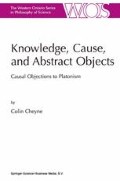Abstract
-
(SC) S knows that p only if the fact that p is causally connected to S’s belief that p
Access this chapter
Tax calculation will be finalised at checkout
Purchases are for personal use only
Preview
Unable to display preview. Download preview PDF.
References
Others may not use the terms ‘viable’ and ‘plausible’ in the same sense as I do.
‘[N]othing ever was, or can be, proved by syllogism, which was not known, or assumed to be known, before.’ (Mill 1843/1973, p. 183).
The following argument is based on Cheyne 1989, pp. 16–17.
Plenitudinous or ‘profligate’ platonists grasp the nettle and assert that all possible sets exist in the one realm. I discuss plenitudinous platonism in Chapter 12.
The if-thenist theory for construing mathematics is (roughly) the claim that all mathematical propositions are logically true conditional statements of the form ‘A dT’, where A represents the conjunction of the axioms of a particular theory and T any theorem which can be derived from those axioms. (See Russell 1919, p. 204.)
Musgrave (1993, ch. 13) makes this point
Based on an argument of Field 1989, pp. 33–34.
It is far from clear that it is a case of entailment or logical consequence. No matter, since I propose that the whole idea be discarded.
Author information
Authors and Affiliations
Rights and permissions
Copyright information
© 2001 Springer Science+Business Media Dordrecht
About this chapter
Cite this chapter
Cheyne, C. (2001). Is a Causal Connection Necessary for Knowledge?. In: Knowledge, Cause, and Abstract Objects. The Western Ontario Series in Philosophy of Science, vol 67. Springer, Dordrecht. https://doi.org/10.1007/978-94-015-9747-0_5
Download citation
DOI: https://doi.org/10.1007/978-94-015-9747-0_5
Publisher Name: Springer, Dordrecht
Print ISBN: 978-90-481-5836-2
Online ISBN: 978-94-015-9747-0
eBook Packages: Springer Book Archive

